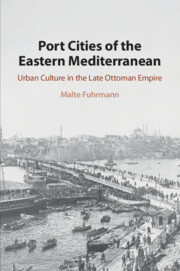Book contents
- Port Cities of the Eastern Mediterranean
- Port Cities of the Eastern Mediterranean
- Copyright page
- Contents
- Figures and Table
- Acknowledgments
- Part I Introduction
- Part II Constructing Europe
- Part III The City’s New Pleasures
- Part IV Identities on the Mediterranean Shore
- Part V The End of the European Dream
- 20 The Lack of an Anti-European Perspective
- 21 Economies of Violence and Challenges to the Thalassocentric Order
- 22 The Anti-Western Rebellion on the Eve of the Belle Époque
- 23 Deconstructing the European Female
- 24 The “Unraveling” of Port City Society
- Part VI Europe and the Eastern Mediterranean Revisited
- Bibliography
- Index
22 - The Anti-Western Rebellion on the Eve of the Belle Époque
from Part V - The End of the European Dream
Published online by Cambridge University Press: 09 October 2020
- Port Cities of the Eastern Mediterranean
- Port Cities of the Eastern Mediterranean
- Copyright page
- Contents
- Figures and Table
- Acknowledgments
- Part I Introduction
- Part II Constructing Europe
- Part III The City’s New Pleasures
- Part IV Identities on the Mediterranean Shore
- Part V The End of the European Dream
- 20 The Lack of an Anti-European Perspective
- 21 Economies of Violence and Challenges to the Thalassocentric Order
- 22 The Anti-Western Rebellion on the Eve of the Belle Époque
- 23 Deconstructing the European Female
- 24 The “Unraveling” of Port City Society
- Part VI Europe and the Eastern Mediterranean Revisited
- Bibliography
- Index
Summary
This chapter reviews three incidents of urban violence in the late Ottoman port cities: the 1876 St. George's Day intercommunal riots resulting in the lynching of the French and German consuls of Thessaloniki; the 1881 intercommunal riots in Alexandria, resulting in the British Navy shelling the city and occupying the country; and the 1903 bomb attacks in Thessaloniki by Macedonian separatists. It comes to the conclusion that incidents of violence that targeted European foreigners and non-Muslims indiscriminately most often did not succeed. Therefore, in the particular sociocultural climate of the nineteenth-century Eastern Mediterranean, agents often resorted to discrediting communities separately, as this held higher chances success, even against Western parties.
- Type
- Chapter
- Information
- Port Cities of the Eastern MediterraneanUrban Culture in the Late Ottoman Empire, pp. 364 - 370Publisher: Cambridge University PressPrint publication year: 2020

